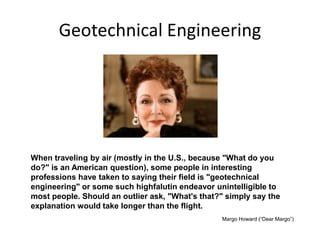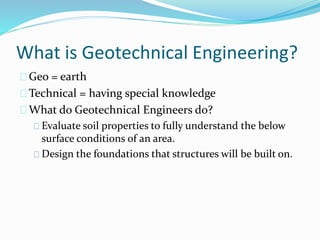The Facts About Geotheta Uncovered
The Facts About Geotheta Uncovered
Blog Article
The Ultimate Guide To Geotheta
Table of ContentsSome Known Details About Geotheta The Only Guide for GeothetaSome Known Incorrect Statements About Geotheta Geotheta Fundamentals Explained
They collaborate with civil engineers, structural engineers, engineers, and various other experts to incorporate geotechnical considerations into the total project layout and building process. This calls for efficient synergy, coordination, and communication to make certain that the geotechnical aspects straighten with the task objectives and fulfill governing demands.Mining & Materials Engineering: Principles of boring, infiltration prices, and aspects influencing the choice of boring technique. Characteristics of nitroglycerins, firing systems and blast patterns. Blowing up strategies in surface and below ground workings. Special blasting techniques at excavation boundaries. Resonance and noise control. Mechanical and constant strategies to fragmentation, consisting of longwall shearing and fullface boring.
Integrated analysis of fragmentation and comminution procedures. Used by: Mining & Products Design.
The Ultimate Guide To Geotheta
Bachelor's level programs in civil, geotechnical, geological, and environmental engineering normally last four years and include basic education programs in English, social scientific research, and the humanities, along with training courses in sophisticated maths, structural geology, and fluid mineralogy. (http://peterjackson.mee.nu/do_you_ever_have_a_dream#c2153)
Geotechnical design involves the analysis of the dirt and rock problems at a specific site, and their implications for the growth of that site. As most frameworks depend on the ground for support, it is without shock that an in-depth understanding of the ground problems, and the viability of structure systems, are crucial to the long-term security and performance of the building or structure.
Specialising in the examination of geological formations and ground practices, geotechnical engineers execute scientific examinations and screening to understand the impact these geological developments might have on the design and building of structure, civil and facilities jobs. This expertise is critical for the layout and building of structures, roads, passages, dams, bridges, and supply of water and sewer system.
The geotechnical team at Douglas Partners consistently speak with designers, style engineers, designers, and contractors to make referrals on layout and growth propositions to make certain that the built frameworks are accordingly made for the ground problems. For instance, the style of footing systems needs to take into consideration the weight of the framework, the capacity of the ground to support that weight along with activity resistances and efficient building.
Geotheta for Dummies
This task is greatly streamlined by the use our Douglas Map geospatial system which makes this information readily available in a simple to use internet internet browser user interface. A geotechnical designer will certainly direct the exploration of boreholes and examination pits to accumulate soil and various other samples, and also evaluate surface area functions and ground direct exposures to create a geotechnical design of the subsurface conditions.
Depending on the project type and ground conditions encountered, research laboratory screening may to name a few points examine stamina, compressibility, sensitivity and/or permeability of dirt and rock examples. Hereafter information is accumulated and collated, the results are used for a geotechnical design of the website, which is generally provided as sections throughout the website.

A geotechnical investigation naturally can only assess the ground conditions at the places drilled or excavated. Natural variations in soil and rock conditions can happen across a site and between test areas. It is consequently great method that the geotechnical engineer be maintained throughout building and construction of the project to offer on-site verification that the ground conditions run into are regular with the assumptions and recommendations supplied in the geotechnical examination report.
The Ultimate Guide To Geotheta
Geotechnical engineers use their thorough knowledge of soil and rock to analyze danger and address problems on diverse infrastructure projectsGeotechnical design is a specialist branch of civil engineering which checks out the behaviour of planet products and the application of soil and rock auto mechanics. Geo Tech Engineer. As a geotechnical engineer, you will assess the physical, mechanical and chemical residential or commercial properties of dirt and rock in order to design structures, maintaining frameworks and earthworks
Geotechnical design is carefully linked to and overlaps with, both engineering geology and ground design - https://www.provenexpert.com/geotheta/. It's possible to specialise in geotechnics or help a geotechnical company but be referred to as a design geologist or a ground engineer. As a geotechnical engineer, you'll require to: construct and maintain connections with clients and various other specialists entailed in the website, throughout each projectmaintain safety and security requirements on site bear in mind price implications when you make recommendationsstudy geological maps and aerial pictures from an array of sources and from different time periodsexamine building and construction plans to see just how possible they are based upon your understanding of the siteinvestigate dangers or geological threats for the sitesearch for ecologically delicate functions, such as land fill beginning to establish accurate and interpretive ground modelsplan area investigationsdrill and evaluate samples of bedrock, dirt, groundwater and added materials oversee various other specialists on sitesolve technological issues as they develop, such as unforeseen structures at drill sitesmonitor conditions throughout and after building to ensure structures are secure in the short and long termadding information accumulated on site to your preliminary researchcreating geotechnical estimations, drawings, and 2 or three-dimensional computer system models analyzing the datamaking suggestions regarding the suggested use the website

Report this page